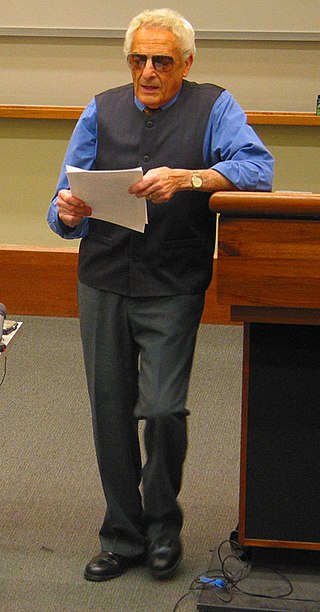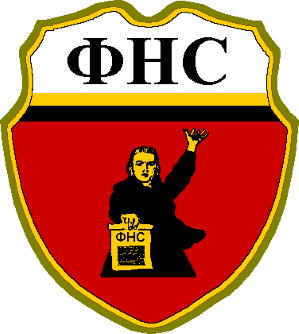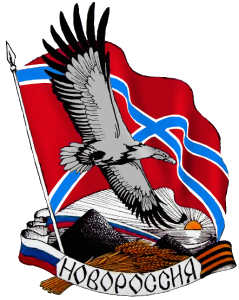
Fascism is a far-right, authoritarian, ultranationalist political ideology and movement, characterized by a dictatorial leader, centralized autocracy, militarism, forcible suppression of opposition, belief in a natural social hierarchy, subordination of individual interests for the perceived good of the nation and race, and strong regimentation of society and the economy.

Anthony James Gregor was a political scientist, eugenicist and professor of political science at the University of California, Berkeley, well known for his research on fascism, Marxism, and national security.

Aleksandr Gelyevich Dugin is a Russian political philosopher, analyst, and strategist, known for views widely characterized as fascist.

The National Bolshevik Party, also known as the Nazbols, operated from 1993 to 2007 as a Russian political party with a political program of National Bolshevism. The NBP became a prominent member of The Other Russia coalition of opposition parties. Russian courts banned the organization and it never officially registered as a political party. In 2010, its leader Eduard Limonov founded a new political party, called The Other Russia. There have been smaller NBP groups in other countries.
Fascist has been used as a pejorative epithet against a wide range of people, political movements, governments, and institutions since the emergence of fascism in Europe in the 1920s. Political commentators on both the Left and the Right accused their opponents of being fascists, starting in the years before World War II. In 1928, the Communist International labeled their social democratic opponents as social fascists, while the social democrats themselves as well as some parties on the political right accused the Communists of having become fascist under Joseph Stalin's leadership. In light of the Molotov–Ribbentrop Pact, The New York Times declared on 18 September 1939 that "Hitlerism is brown communism, Stalinism is red fascism." In 1944, the anti-fascist and socialist writer George Orwell commented on Tribune that fascism had been rendered almost meaningless by its common use as an insult against various people, and posited that in England fascist had become a synonym for bully.

Russian National Unity or All-Russian civic patriotic movement "Russian National Unity" was an unregistered neo-Nazi, irredentist group based in Russia and formerly operating in states with Russian-speaking populations. It was founded by the ultra-nationalist Alexander Barkashov. The movement advocated the expulsion of non-Russians and an increased role for traditional Russian institutions such as the Russian Orthodox Church. The organization was unregistered federally in Russia, but nonetheless collaborated on a limited basis with the Federal Security Service. The group was banned in Moscow in 1999 after which the group gradually split up in smaller groups and their webpage became defunct in 2006.

Yegor Semyonovich Stroyev is a Russian politician and statesman who served as chairman of the Federation Council of Russia between 1996 and 2001. Previously, he was governor of Oryol Oblast from 1993 to 2009. He had a major post in the Communist Party of the Soviet Union. Stroyev was reelected as governor with a very large majority. He was removed from his position on February 16, 2009 by Dmitry Medvedev due to economic concerns.
Aleksandr Kuzmich Ivanov-Sukharevsky is a far-right politician in Russia. He was the leader of the Peoples National Party (NNP).

The People's National Party was a minor far-right political party in Russia. Its leader was Aleksandr Ivanov-Sukharevsky, who founded the party in 1994 with, it has been alleged, the aid of two veterans of the Black Hundreds Vladimir Osipov and Vyacheslav Demin.

Alexander Petrovich Barkashov is a Russian political leader and far-right nationalist who in 1990 founded Russian National Unity, a fascist paramilitary organization.
The term red–green–brown alliance, originating in France in the 2000s, refers to the alliance of leftists (red), Islamists (green), and the far right (brown). The term has also been used to describe alleged alliances of industrial union-focused leftists (red), ecologically-minded agrarians (green), and the far right (brown).
What constitutes a definition of fascism and fascist governments has been a complicated and highly disputed subject concerning the exact nature of fascism and its core tenets debated amongst historians, political scientists, and other scholars since Benito Mussolini first used the term in 1915. Historian Ian Kershaw once wrote that "trying to define 'fascism' is like trying to nail jelly to the wall".
Konstantin Rodionovich Kasimovsky is a Russian neo-Nazi. Formerly a member of Pamyat, he has led two parties of his own, the Russian National Union and the Russian National Socialist Party, as well as a less well-defined group known as Russian Action. It is claimed that he split from Pamyat and became convinced of Nazism after a 1992 visit to Transnistria.

Russian nationalism is a form of nationalism that promotes Russian cultural identity and unity. Russian nationalism first rose to prominence in the early 19th century, and from its origin in the Russian Empire, to its repression during early Bolshevik rule, and its revival in the Soviet Union, it was closely related to pan-Slavism.

The National Salvation Front was a broad coalition of communist, socialist, and right-wing nationalist movements against the government of President Boris Yeltsin in Russia. Established in 1992, the FNS was the first group to be banned in post-Soviet Russia before playing a leading role in the 1993 Russian constitutional crisis.
Red fascism is a term equating Stalinism, Maoism, and other variants of Marxism–Leninism with fascism. Accusations that the leaders of the Soviet Union during the Stalin era acted as "red fascists" were commonly stated by anarchists, left communists, social democrats and other democratic socialists as well as liberals and among right-wing circles.
Authoritarian democracy is a form of democracy directed by a ruling elite of an authoritarian state that seeks to represent the different interests of society. Authoritarian democracy has also been called "organic democracy" by some proponents. In use for cases of fascism and Stalinism it has also been referred to as totalitarian democracy.

The New Russia Party, or Novorossiya Party, is a political party operating in Ukraine, and in particular regions of Ukraine annexed by Russia The organization was founded by pro-Russian separatists, under the leadership of Pavel Gubarev, on 14 May 2014. The party is formally known as the Social-Political Movement "New Russia Party". It is not registered with the Ministry of Justice of Ukraine.
Vladimir Nikolaevich Osipov was a Russian writer who founded the Soviet samizdat journal Veche (Assembly). The journal is considered to be an important document of the nationalist or Slavophile strand within the Soviet dissident movement.
Fascist syndicalism was a trade syndicate movement that rose out of the pre-World War II provenance of the revolutionary syndicalism movement led mostly by Edmondo Rossoni, Sergio Panunzio, A. O. Olivetti, Michele Bianchi, Alceste De Ambris, Paolo Orano, Massimo Rocca, and Guido Pighetti, under the influence of Georges Sorel, who was considered the “‘metaphysician’ of syndicalism.” The Fascist Syndicalists differed from other forms of fascism in that they generally favored class struggle, worker-controlled factories and hostility to industrialists, which lead historians to portray them as “leftist fascist idealists” who “differed radically from right fascists.” Generally considered one of the more radical Fascist syndicalists in Italy, Rossoni was the “leading exponent of fascist syndicalism.”, and sought to infuse nationalism with “class struggle.”












